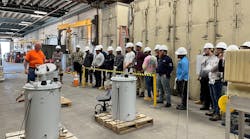Mentoring and coaching young people has been extremely rewarding for Michael Donohue, executive vice president at Utilidata. Throughout his career, Donohue has always made an effort to spend time with younger colleagues and students to help guide them on their own professional journeys.
Utilidata, a technology company that specializes in Volt/VAR control, is collaborating with Brown University in Providence, Rhode Island. Through the company’s involvement with the school’s economics and engineering department, Utilidata is engaging faculty and students to solve “some of the most complex problems facing utilities today,” Donohue said. “They have been an amazing partner in creating a bridge between fundamental research and application to our most pressing problems. In addition, through our cooperation with the Brown Career Center and participation in many of its Career Fairs, Utilidata has hired many interns to work with our engineering, development and sales and marketing teams.”
Donohue pointed out that this injection of bright, young talent has been great for the organization and a positive learning experience for the students. “We have actually made offers of employment to two graduates who we hope will be joining the team later this spring,” he said. “I have had the pleasure of working closely with all of these students, helping to mentor and guide them as they navigate their academic careers and give thought to opportunities beyond Brown. It has been such a pleasure and growing experience for me as well.”
Donohue will also be presenting a session at EUCI on Volt/VAR optimization on May 7 in San Jose, California. Highlights of his presentation, Proof of Concept Process for Volt/VAR Control, include:
- Application of VVO Technology
- Benefits of VVO and CVR
- The VVO/CVR Business Case
- Regulatory Examples
- Selected Case Histories
- VVO’s Role in the Modern Grid
“Many utility engineers, state regulators and third-party consultants are not yet fully educated on how Volt/VAR optimization can be used as a tool to help achieve goals and accrue benefits. This is not your grandfather’s CVR,” Donohue said. “Learning more about the various methods used to achieve voltage and VAR control, and understanding the limits of model-based solutions that rely on historic data, is critical. What we help these professionals learn, in addition to explaining the difference in technologies, is that there is a business case to be made for VVO in most organizations, whether they have a DMS system or are in the process of deploying DMS, whether they have an AMI roll-out or not, or whether they have a regulatory mandate to meet.”
Understanding feeder selection criteria and end goals is also critical, according to Donohue. “The benefits of VVO are accrued up-front, but the technology can also be leveraged to take advantage of any future optionality down the road, such as increased renewables penetration or smart meter installation.”
Donohue knows the utility business and brings that combination of engineering and business expertise to his educational sessions. Prior to joining Utilidata, he was executive vice president of sales at GridPoint from 2009 to 2012, and spent 15 years with Accenture, where he was managing partner in the Utility/Smart Grid Practice from 2002 to 2009. As a strategic partner at Accenture with clients that included Exelon, Entergy, Southern Company, Xcel Energy, he has experience with electric utilities and technology providers – understanding both their business issues and engineering realities as they relate to technology. He has overseen many technology implementation projects that required an extensive understanding of the business case for change, a comprehensive approach to the regulatory treatment of the new technology, coordination between many eco-system partners and coordinated teamwork to achieve specific milestones for the customer and regulator.
What is exciting for him now is the sudden interest around VVO, compared to the “relative quiet of only six months ago,” he said. “As regulators begin to support VVO as an energy efficiency tool in key states like California and Ohio, the rest of the nation is watching. Many states are now open to learning about VVO or to allowing incumbent utilities to explore VVO pilots, including our home state of Rhode Island where Utilidata won a competitive bidding process to roll out a 7-circuit VVO project with National Grid over the next two years.”
He also enjoys that combination of business and engineering in his current role at Utilidata. “I decided to go into this field because it combined my interests in both engineering and business. In addition, there is a tremendous opportunity for technology to improve the outcomes for customers, regulators and the environment.”
Donohue tells utilities that they really need a thought partner when it comes to the process of exploring and implementing a VVO project. “From the process of collaborating with regulators and understanding the regulatory drivers to recovery and importance of robust measurement and verification results, to building the business case and properly selecting feeders that will help achieve long-term goals, having an agile, experienced and innovative partner is critical.”
Donohue surprises his colleagues with his outside interests, once again enjoying engineering in another aspect: He leverages his mechanical engineering degree to support his passion for Formula 1 racing and in maintaining his motorcycle and automobiles. He is also involved in family activities that include traveling, equestrian events, varied sports activities, and skiing.


